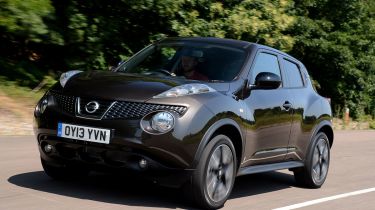Nissan Juke
Engine tweaks aim to keep big-seller fresh against rivals
The looks are divisive, but there’s nothing wrong with how the Juke drives. The dCi diesel is a lot better here than it is in the Captur, thanks mostly to the six-speed gearbox. But the cramped interior, tiny boot and firm ride on 18-inch wheels all count against Nissan.
With a wave of new compact crossovers flooding the market, Nissan’s big-selling Juke is under attack. In a bid to keep the British-built model competitive, the 1.5-litre dCi diesel engine has been revised making it more powerful and efficient. Will this be enough to fend off the challenge of these two new rivals?
In terms of looks, the Juke remains divisive, with bulbous bumpers, large, round foglights, a squat body and tiny windows, while this n-tec model gets big 18-inch alloys. The Juke contrasts greatly with the more traditional lines of the 2008, but follows a similar design-led approach to the Captur. Thanks to a raised driving position you have a commanding view of the road, and you feel more like you’re driving an SUV than in the Renault or Peugeot.
The cabin is comfortable and stylishly arranged around a painted central console, and the controls are logically arranged, too. However, build quality and the materials used are slightly lacklustre: the door and dash plastics are flimsy, and the shiny trim scratches easily.
Used - available now

2023 Peugeot
208
16,998 milesAutomaticPetrol1.2L
Cash £14,755The Peugeot’s more refined gloss black and chrome finish looks and feels more upmarket. The Juke is longer than the Captur, but a shorter wheelbase means it’s surprisingly cramped inside. Rear passengers especially suffer, and have to contend with narrow door openings, a sloping roofline, and limited legroom.
The small, tinted back windows don’t let much light in, either, which adds to the feeling of claustrophobia. Load space is poor, too, with the 251-litre boot only increasing to 830 litres with the seats down – the Captur has a 1,235-litre maximum. The Juke doesn’t include as many clever storage spaces as the Renault, although there is a deep lift-out tray under the boot floor.
On the road, the Juke is decent to drive and feels well balanced in corners, although those large alloy wheels do spoil ride comfort, and it lacks the composure of the Peugeot. The Nissan grips the road well, though, and there’s not much body roll. In fact, of these three cars, it’s the Juke that comes closest to feeling like a conventional hatchback in corners.
This is enhanced by Nissan’s Dynamic Control System, which offers both sporty and eco-friendly modes – although even in sporty mode the steering remains relatively numb. Updates to the 1.5 dCi diesel include new injectors and a turbo, plus a more efficient oil pump. This means the 109bhp engine now has more torque – up 20Nm to 260Nm.
At the test track, the Juke was quicker off the line than the Captur. In terms of economy, though, it returned 40.7mpg – the poorest on test. The Juke is slightly cheaper to buy than its rivals but has similar equipment, with climate control, Bluetooth, an iPod connection, sat-nav and a reversing camera all standard.
Will this cheaper purchase price take the Juke to the front of this battle?



